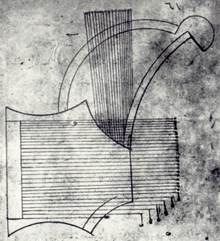Kitab al-Musiqa al-Kabir

Kitab al-Musiqa al-Kabir (Arabic: كِتٰبَ ٱلمُوْسِيقَىٰ ٱلكَبِيرُ, transl. the Great Book of Music) is a treatise on music in Arabic by the Islamic Golden Era philosopher al-Farabi (872-950/951). The work prescribes different aspects of music such as maqamat, and is believed to be influenced by the Pythagorean theory of harmonic ratios. The book was translated into Hebrew by Joseph ben Judah ibn Aknin.
Content
Al-Farabi divided Kitab al-Musiqa al-Kabir into two treatises.
The first treatise is composed of two parts; following the Aristotelian tradition, al-Farabi split his study of music into a theoretical and practical aspect:[1]
- The first part, which consists of two discourses, is an introduction which establishes the theoretical principles of music and investigation into how sound is generated.
- The second part applies the theoretical principles established in the first part to the musical instruments that were in use during al-Farabi’s time, while also discussing musical intervals and different kinds of melodies.
The second treatise was intended to be a commentary to the thought of previous theorists of music, but it is not extant.[2][3]
References
- ^ Gulzhikhan, Nurysheva; Nurfer, Tercan (2021). "Farabi's Philosophy of Music: The Legality of Music". Central Asian Journal of Art Studies. VI (1): 10–26. doi:10.47940/cajas.v6i1.318.
- ^ Sawa, George D. (January 24, 2012). Ehsan Yarshater (ed.). "Fārābī v. Music". Encyclopædia Iranica. Encyclopædia Iranica Foundation. Retrieved 13 April 2023.
- ^ Kitab al musiqa al kabir (in Arabic). Arab Writer. 1974.
External links
